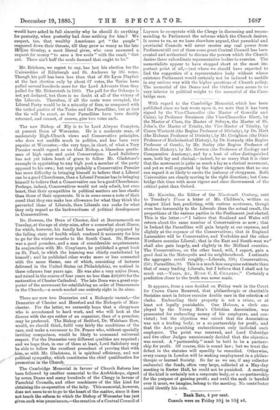It appears, from a case decided on Friday week in
the Court for Crown Cases Reserved, that philanthropic or charitable Societies must in future exercise double care in the selection of clerks. Embezzling their property is not a crime, or at least not legally punishable. One Hobson, a clerk em- ployed by the Young Men's Christian Association, was prosecuted for embezzling money of his employers, and con- victed; bat the objection was raised that the Association was not a trading body, or a co-partnership for profit, and that the Acts punishing embezzlement only included such employers. The point was reserved, and Lord Coleridge and five other Judges unanimously decided that the objection was sound. A. "partnership" must be held to be a partner- ship for profit. Of course, this is sound law ; bat we trust the defect in the statutes will speedily be remedied. Otherwise, every scamp in London will be seeking employment in a philan- thropic or learned Society. So far as we see, if any collector embezzled the funds, often very large, collected at a May-day meeting in Exeter Hall, he could not be punished. A meeting of the kind is certainly not a corporate body, or a co-partnership for the purpose of gaining profit; and until the cash is handed over it must, we imagine, belong to the meeting. No contributor could identify his coin.










































 Previous page
Previous page